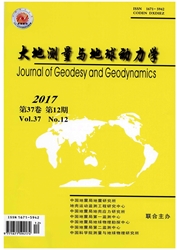
欢迎您!东篱公司
退出

 中文摘要:
中文摘要:
为提高卫星钟差预报的精度,采用最小二乘支持向量机进行预报。对比不同核函数对LS-SVM预报精度的影响,并将其与二次多项式和灰色系统模型比较。结果表明,最小二乘支持向量机的短期(1天)预报精度明显优于另外两种模型,且线性核函数更适合最小二乘支持向量机的钟差预报。
 英文摘要:
英文摘要:
To improve the prediction accuracy of satellite clock error, least squares support vector machines (LS-SVM) is employed. The impact of the kernel function type on LS-SVM is analyzed. Furthermore, the prediction accuracy is compared with that of the secondary are polynomial and grey system model. The results show that the LS-SVM method has higher accuracy than two other methods, and the linear kernel function is better than others for the method.
 同期刊论文项目
同期刊论文项目
 同项目期刊论文
同项目期刊论文
 期刊信息
期刊信息
